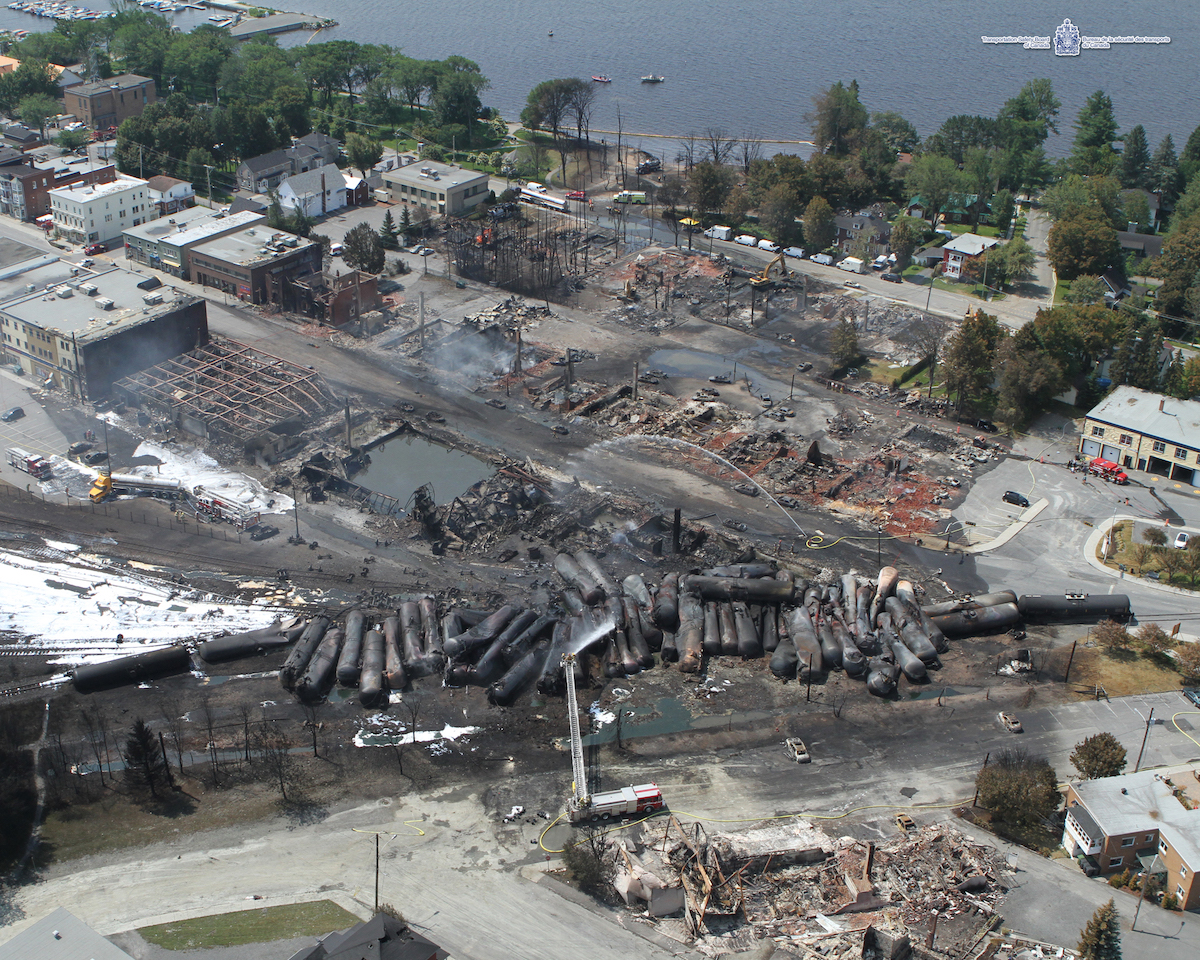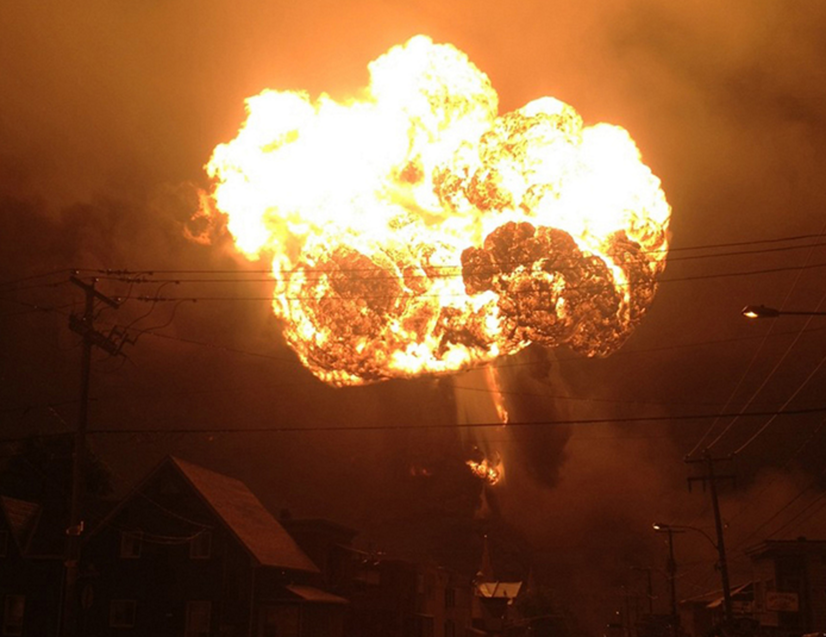The oil industry in North Dakota and Montana — home to the prolific Bakken Shale Formation — faces an “impossible choice.” That’s according to a new petition to federal regulators from the attorneys general of North Dakota and Montana, in response to a Washington state law that aims to prevent trains hauling oil through the state from derailing and exploding.
That choice is to either remove the volatile components, such as butane, from Bakken crude oil before being loaded into rail tank cars, or send the volatile oil to other, harder-to-reach markets because — as the petition argues — removing the butane would cut into oil producers’ profits, and almost 60 percent of the crude leaving North Dakota by rail goes to Washington refineries.
In addition the states assert that the Washington state law is preempted by existing federal rules governing hazardous materials and crude oil transport. The new Washington law sets a limit for the allowable vapor pressure — and therefore volatility — of crude oil moved by rail, or more precisely, of crude oil loaded or unloaded from rail cars in the state.
To achieve that limit, Bakken oil producers would have to remove the butane and other volatile components such as propane from its oil using facilities and infrastructure that would have to be built in North Dakota and Montana — something the attorneys general call a “prohibitively expensive undertaking,” an apparent sign of the industry’s reluctance to make such an investment.
Which is why the oil-rich states are asking the federal government to overrule Washington’s law.
Attorneys general for North Dakota and Montana asked the Trump administration on Wednesday to overrule a Washington state law that imposed new restrictions on oil trains from the Northern Plains to guard against explosive derailments.https://t.co/qtqWiuMzXQ
— KOMO News (@komonews) July 18, 2019
While the oil industry has claimed repeatedly that Bakken oil is no different than other crude oils, North Dakota and Montana’s petition clearly states that Bakken crude is more valuable because of its high levels of butane — a valuable difference.
Excerpt from petition to overide Washington regulations. Credit: The States of North Dakota and Montana, Letter to PHMSA
The Science of Bomb Trains Is Clear
For the past five years, I’ve covered the issue of Bakken crude oil’s volatility — even devoted the entire second chapter of my recent book on oil trains to this subject — and noted how the oil and rail industries over and over again have challenged basic petroleum science to justify delaying regulations. The reason rail operators call these trains “bomb trains” is because of their tendency to explode into giant fireballs after derailing.
Those exploding trains’ oil cargo is highly volatile, which means it readily vaporizes, due to the presence of natural gas liquids such as butane. There’s a reason butane and propane are used in torches and grills. They’re highly flammable.
Yet the oil industry has been trying to avoid regulations governing oil volatility because of the additional processing, and costs, required to move a less volatile product by rail. Again and again, the industry, led by the American Petroleum Institute, claims that the volatility of Bakken crude isn’t a problem and doesn’t need to be regulated.
So far, that approach has worked. These trains continue to haul volatile oil across North America.
One way that the oil industry — with the help of compliant regulators and legislators — manages to avoid regulation is by claiming an issue is too uncertain and needs additional research before any laws or rules should govern that area. As I’ve detailed, a convoluted version of this process was used to repeal safety regulations requiring modern brakes on oil trains.
And the oil industry has effectively used the same approach to delay any regulations on the volatility of crude oil moved by rail. Oil industry lobbying groups have argued that the science of crude oil volatility is not well enough established and requires ongoing studies — an extraordinary claim considering the many well-funded petroleum science and engineering programs around the world.
Lac-Mégantic fireball from the oil train explosion in 2013. Credit: Steve Poulin/Agence QMI, CC BY–NC–ND 2.0
This week the Bismarck Tribune reported that North Dakota officials disputed the idea that removing butane would reduce the risks of moving Bakken crude by rail. They claimed that the Washington law “lacks a scientific basis” and that Bakken crude is no more volatile than crude oil produced elsewhere.
Over four years ago, the Obama Department of Energy (DOE) agreed that it needed to study Bakken crude oil to determine if it should be regulated. At the time the DOE said this would take two years to accomplish.
In April 2015, industry publication Railway Age asked the DOE why the agency needed to do yet further research on what by all other accounts is well-established science. In reporting on the lack of response from DOE, Railway Age was quite blunt in assessing the situation: “There was no response from the Department of Energy to our request for more information about the study, specifically why it needs two more years to figure out what by now should be obvious to the dullest high school chemistry student.”
“The notion that this requires significant research and development is a bunch of BS,” Ramanan Krishnamoorti, a petroleum engineering professor at the University of Houston, told Al Jazeera in April 2015. “The science behind this has been revealed over 80 years ago, and developing a simple spreadsheet to calculate risk based on composition and vapor pressure is trivial. This can be done today.”
Over four years later, the DOE has yet to complete its study of Bakken crude.
In March, North Dakota oil regulator Lynn Helms recommended that it would be prudent to wait for the results of the DOE study before moving forward on any regulation.
Deregulation in the Trump Era
While the Obama administration passed some modest protections related to oil trains, a rule governing oil volatility never made it into the final regulations passed in 2015. By now, the Trump administration has already repealed and withdrawn critical oil-by-rail safety regulations. Furthermore, the Department of Transportation recently made clear that its preferred regulatory approach for oil trains will allow the oil and rail industries to volunteer to make any safety improvements — effectively allowing the industries to self-regulate.
North Dakota and Montana’s petition continues the trend of ignoring well-established oil science and prioritizing the profits-over-safety approach that in the past has led to oil train derailments, explosions, and even deaths.
Main image: Lac-Mégantic, Quebec after an oil train carrying Bakken crude derailed and exploded, leveling the downtown in 2013. Credit: Transportation Safety Board Canada, CC BY–NC–ND 2.0
Subscribe to our newsletter
Stay up to date with DeSmog news and alerts








